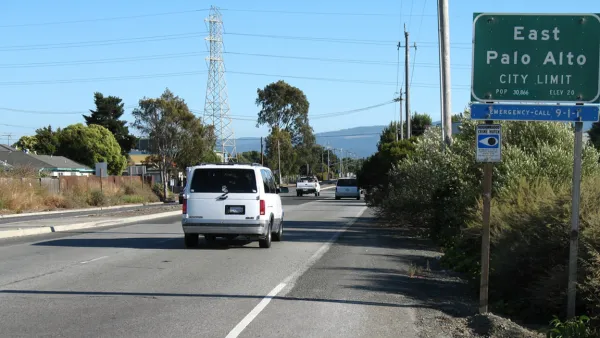With Los Angeles now planning to install HOT lanes, a pair of recent articles in the L.A. Times question whether congestion pricing is a way to help the rich at the expense of the poor, or a practical solution to traffic congestion and its ills.
Tim Rutten questions the fairness of charging for access to carpool lanes, and accuses local officials of embracing congestion pricing simply due to the availability of federal funding.
"When the Metropolitan Transportation Authority voted Thursday to convert carpool lanes to toll routes on as many as three Los Angeles freeways, the question of just what that decision begrudges to whom was lost in a flurry of self-congratulation.
Los Angeles Mayor Antonio Villaraigosa called the move "a great opportunity to think outside the box," and added: "Part of the reason Los Angeles has not been able to grapple with gridlock is because we've been unable to make the tough decisions."
Right. It takes unconventional and courageous thinking to come up with a plan that clears a highway lane for the well-off, while the middle class and working poor are left to inhale each other's $5-a-gallon exhaust fumes."
However, transit consultant Michael Eshleman responds that the plan simply ensures that drivers pay the full costs, and will encourage residents to revisit decisions about where they live and work.
"It helps to compare freeways to restaurants to understand their shortcomings. Like freeways, most restaurants experience "peak hours," when demand outstrips supply. These periods are typically brief (a few hours at a time), and often the rest of the day there is a glut of capacity.
Congestion pricing will encourage those unwilling or unable to pay to use toll roads to either change their address or change their commuting behavior. This policy will affect the pocketbooks of the poor more acutely than the wealthy, should they decide to drive in the toll lanes. But driving in general already brings with it an exorbitant cost of entry for low-income people: One must purchase an expensive vehicle, insure it, register it, maintain it and purchase fuel for it. And it should be noted that this policy will primarily affect single-occupant low-emissions vehicle owners and carpoolers (though carpoolers will pay a reduced rate). This policy will improve mobility for buses and those willing to pay the toll. Those who do not want to pay are still perfectly free to use general-purpose lanes and do what they currently do: sit in traffic."
FULL STORY: Taking the 'free' out of freeway

Analysis: Cybertruck Fatality Rate Far Exceeds That of Ford Pinto
The Tesla Cybertruck was recalled seven times last year.

National Parks Layoffs Will Cause Communities to Lose Billions
Thousands of essential park workers were laid off this week, just before the busy spring break season.

Retro-silient?: America’s First “Eco-burb,” The Woodlands Turns 50
A master-planned community north of Houston offers lessons on green infrastructure and resilient design, but falls short of its founder’s lofty affordability and walkability goals.

Test News Post 1
This is a summary

Analysis: Cybertruck Fatality Rate Far Exceeds That of Ford Pinto
The Tesla Cybertruck was recalled seven times last year.

Test News Headline 46
Test for the image on the front page.
Urban Design for Planners 1: Software Tools
This six-course series explores essential urban design concepts using open source software and equips planners with the tools they need to participate fully in the urban design process.
Planning for Universal Design
Learn the tools for implementing Universal Design in planning regulations.
EMC Planning Group, Inc.
Planetizen
Planetizen
Mpact (formerly Rail~Volution)
Great Falls Development Authority, Inc.
HUDs Office of Policy Development and Research
NYU Wagner Graduate School of Public Service




























